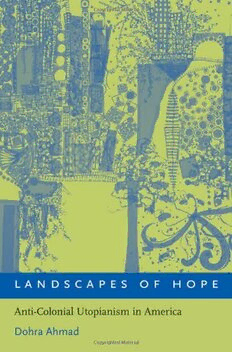
Landscapes of Hope: Anti-Colonial Utopianism in America PDF
261 Pages·2009·1.224 MB·English
Most books are stored in the elastic cloud where traffic is expensive. For this reason, we have a limit on daily download.
Preview Landscapes of Hope: Anti-Colonial Utopianism in America
Description:
Landscapes of Hope: Anti-Colonial Utopianism in America examines anti-colonial discourse during the understudied but critical period before World War Two, with a specific focus on writers and activists based in the United States. Dohra Ahmad adds to the fields of American Studies, utopian studies, and postcolonial theory by situating this growing anti-colonial literature as part of an American utopian tradition. In the key early decades of the twentieth century, Ahmad shows, the intellectuals of the colonized world carried out the heady work of imagining independent states, often from a position of exile. Faced with that daunting task, many of them composed literary texts--novels, poems, contemplative essays--in order to conceptualize the new societies they sought. Beginning by exploring some of the conventions of American utopian fiction at the turn of the century, Landscapes of Hope goes on to show the surprising ways in which writers such as W.E B. Du Bois, Pauline Hopkins, Rabindranath Tagore, and Punjabi nationalist Lala Lajpat Rai appropriated and adapted those utopian conventions toward their own end of global colored emancipation.
See more
The list of books you might like
Most books are stored in the elastic cloud where traffic is expensive. For this reason, we have a limit on daily download.
